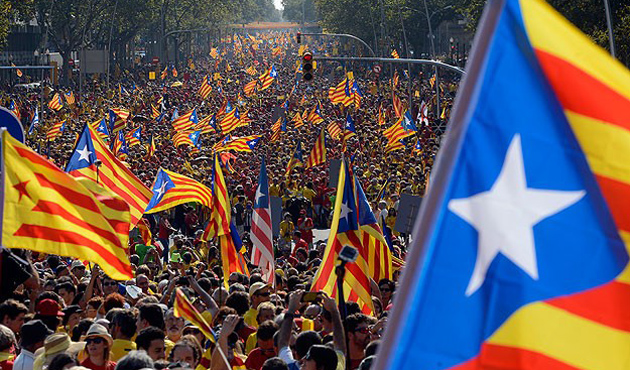Is 1776 Being Experienced in Spain?
November 3, 2017
On October 1, the Autonomous Region of Catalonia in Spain voted to declare independence from the Spanish homeland. A majority of people, about 91% of the Catalan population, voted for a free and independent Catalonian Republic. Throughout the day of voting, polling stations were besieged by the Spanish law enforcement, the Guardia Civil. Catalan nationalists bravely took their stand and guarded polling stations across Catalonia. According to The Guardian, Hundreds of rightful, democratic voters were attacked and injured by the Spanish police just for doing their right as a citizen, voting.
A video posted on various social media outlets and news outlets showed the chaos of the voting in Barcelona and other various cities. A girl was reportedly dragged down a flight of stairs by her hair and thrown outside the polling station by the police. Other voters were hit, punched and stomped on by the police force in the area. The video went viral over social media and caused many to compare the acts to Francisco Franco, a Fascist military dictator who ruled Spain and also persecuted Catalan separatists. The question is, what caused the need for secession in the first place? Why do Catalonians want an independent, self governing republic? These questions and more can be traced back to Spain’s history. Catalonia has been a very important region for Spain in the last couple of centuries. Catalonia is often referred to as the “industrial capital of Spain” because most industry in Spain is located in Catalonia. Not only is Catalonia the industry capital, but it is also the most highly taxed region in Spain. The people of Catalonia feel that their money is not being reinvested into their region. Infrastructure, schools, and health services are poor because they are not being served and aided by the government.
Not only are the economy and political situations in Catalonia a main factor for succession, but also the culture of Catalonia itself. Most Catalans don’t even think of themselves as Spanish at all. First off, there are major language barriers between Catalonia and Spain. Catalans speak a whole different language other than Spanish known simply as the Catalan language. This language barrier makes it hard for diplomatic talks and further connection between Spanish citizens and Catalan citizens. No matter what happens for the future Catalonia, the current Spanish government, and Parliament should think this historic democratic election through. The people of Catalonia have spoken and their voices must be heard.


